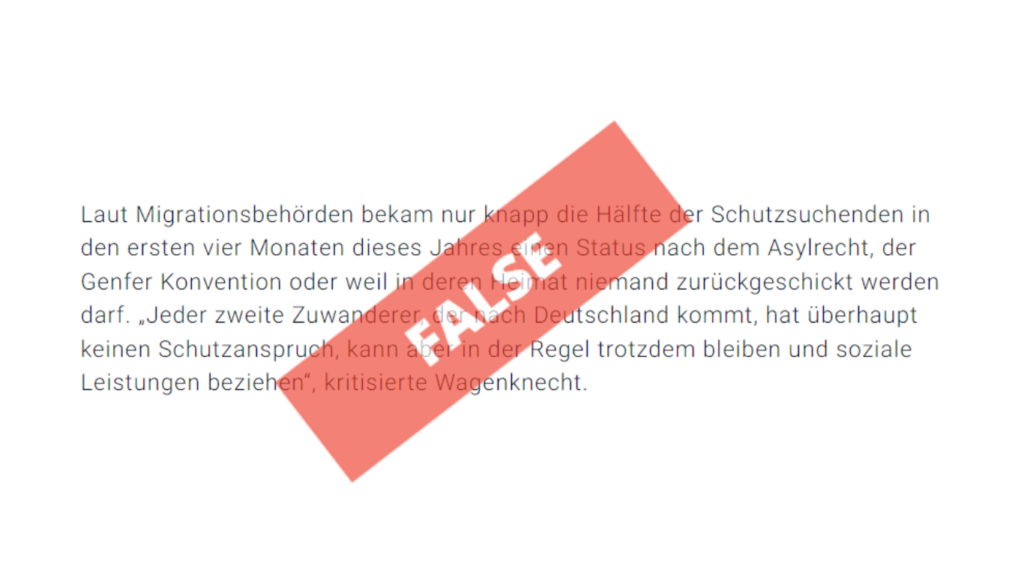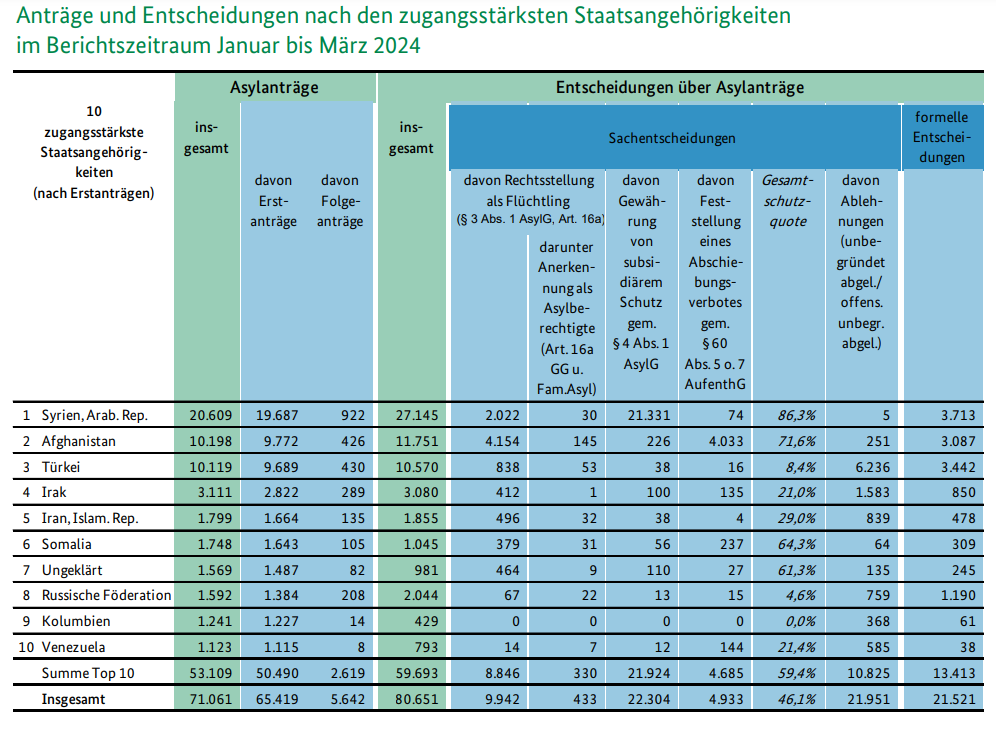On May 11th, German politician Sahra Wagenknecht from the BSW – Reason and Justice party said in an interview: “Every second immigrant who comes to Germany has no right to protection at all, but can usually still stay and receive social benefits.” The claim turns out to be false. Wagenknecht uses a type of framing that is typical for discussions on migration where the word immigrant is used to mean refugee, calling upon an incorrect mental image of the word. Wagenknecht contradicts herself in more ways, as statistics from the German Office for Migration and Refugees show. This is especially interesting in the context of Wagenknecht’s political career and her new political party, as well as in the current context of the European Union and whether these new parties can change the EU policies.

Migration is a central topic in the context of the European Union, especially during election times, according to the results of the opinion research institute ARD DeutschlandTrend. Citizens consistently rank immigration alongside foreign policy conflicts and threats as the most pressing issues for the EU. This is reflected in the widespread support for refugee agreements, which offer significant EU financial aid to countries that control migration flows. Recent agreements, including one with Lebanon, have been endorsed by half of the voters in Germany.
However, there is a notable level of dissatisfaction with the EU’s policies, with two-thirds of voters expressing discontent. This dissatisfaction varies significantly among supporters of different political parties, with parties like Alternative for Germany (AfD) and Alliance Sahra Wagenknecht (BSW) showing higher levels of discontent, whereas the Social Democratic Party (SPD) and the Greens are more positive.
When asked about the issues requiring urgent attention from the EU, 41 percent of citizens prioritize flight, asylum, and integration policies. Following this are concerns about international conflicts, notably with Russia and China, and environmental and economic challenges.
As the EU engages in further refugee agreements to manage migration, these issues remain at the forefront of the electorate’s concerns, underscoring the intricate relationship between domestic public opinion, international policy initiatives, and the effectiveness of the EU’s strategies. This ongoing situation highlights the critical areas of focus for the EU as it approaches upcoming elections.
The claim
In an interview with the German newspaper “Augsburger Allgemeine Zeitung”, the German politician Sahra Wagenknecht demands more action against illegal migration in Germany. In the interview, she claims that every second immigrant who comes to Germany does not have a right to protection but can nonetheless stay in the country and receive social benefits.
From 1991 onwards, Wagenknecht was a member of ‘Party of Democratic Socialism’ (PDS) steering committee. PDS was a left-wing populist political party in Germany active between 1989 and 2007 After PDS, Wagenknecht became a part of ‘Die Linke’, a project spearheaded by Gregor Gysi and Oskar Lafontaine, former Minister-President of Saarland and SPD and her future husband. This left party was founded in 2007 as the result of merge of the ‘Partei des Demokratischen Sozialismus’ (PDS) and ‘Arbeit & soziale Gerechtigkeit – Die Wahlalternative’ (WASG). From 2004 to 2009 Wagenknecht was a member of the European Parliament, and in 2009 became a member of Bundestag. In 2023 she presented the association ‘BSW – Für Vernunft und Gerechtigkeit’ to the press.
Before looking at Wagenknecht’s statement as a whole, it is important to define the term immigrant. In the interview, Wagenknecht uses the terms ‘migration’ and ‘immigrants’. The word immigrant includes refugees, but also refers to other people who leave their country of origin. The organization Pro Asyl, which advocates for the rights of asylum seekers, said to EUfactcheck: “Immigrants are not only asylum seekers, but also, for example, skilled workers, students or spouses who neither need protection nor receive social benefits.”
Wagenknecht appears to be referring to both migrants and refugees in her statement by using the word ‘immigrants’. But what she actually means is asylum seekers, because these are the people who may be eligible for social benefits. This becomes clear because she mentions the ‘right to protection’. This is a specific right that applies only to asylum seekers.
The numbers behind the claim
Although this already means that Wagenknecht’s statement is false, it is still interesting to look at the actual numbers of migrants and asylum seekers as of March 2024. From January to March 2024, about 270.000 people immigrated to Germany. 32 percent were from EU countries and 19 percent were from Ukraine. Every month, the German office for migration and refugees (BAMF) releases the numbers of accepted and rejected asylum seekers.

From January to March 2024, there were around 65.000 first-time applications for asylum.
In that time period, about 37.000 applications for asylum were accepted while 43.000 applications were rejected. This means a 46,1 percent acceptance rate. However, according to Pro Asyl, these numbers do not tell the full story about these people’s need for protection. On the far right of the table, there is the column ‘formal decisions’. According to Pro Asyl, this refers to rejections that are not necessarily made on substantive grounds. The organization says: “Formal decisions are asylum applications that are not processed by the BAMF because the cases have already been dealt with elsewhere, for example because an asylum application is withdrawn or another EU member state is responsible for the asylum procedure.” Many people only receive protection through court action, but Pro Asyl does not have the figures for 2024 as of now. The need for protection is actually higher than the numbers make it seem.
It is also important to add that, as the processing of applications for asylum can take multiple months, these acceptances and rejections are not necessarily linked to the first-time applications. The decisions for those applications may not have been made yet. So Wagenknecht cannot know whether the newest applicants have been accepted or not. Since she doesn’t know this, she can also not know whether a 50 percent acceptance rate is currently accurate. On top of this, these numbers do not show any court proceedings that may change some of the non-positive decisions into positives and they do not represent the actual need for protection.
Framing of the word ‘immigrant’
Wagenknecht’s misuse of the word immigrant is an example of a larger issue: the framing of the word immigrant to only mean refugee, rather than the actual definition of the word which includes both migrants and refugees.
Framing is the theory of how we perceive and communicate about reality. The basis of framing theory is that the media focuses attention on certain events and then places them within a field of meaning. So, when the media, politicians or citizens talk about immigrants, our mental image that appears in our minds is a refugee, despite the fact that the word “immigrant” has a wide definition. An immigrant could be someone who chooses to leave their country of origin by choice, while a refugee is forced to leave. By framing refugees as immigrants, there could be an attempt to portray them as having a choice: that they could have stayed in their country of origin but did not want to. Research shows that immigration is typically positioned as an action the immigrants take to improve their economic status. This consequently portrays refugees who are referred to as immigrants as less in need of humanitarian or social help and therefore perhaps less deserving of it.
The new EU border policy
In the context of the EU, the increase of those hard-right parties can affect the EU border policies, such as the Pact on Migration and Asylum. That is the main example that shows how European countries have adopted hard policies in aspects such as migration and protection.
The European elections of June 2024 can show whether right and hard-right parties have earned more support by citizens. The new law had the support of right parties and social democratic parties, which means that the social democratic parties have adopted the narrative of right and hard-right formations. In fact, the pact responds to the migratory policies of some European countries, as the principal researcher at the Elcano Royal Institute, Carmen González says: “States like Germany, Sweden Belgium, Netherlands, Italy and France are modifying their migratory policies in a more restrictive way”.
So, if more political parties such as Wagenknecht’s formation adopt these ideas of reinforce borders, this new law could be changed in a stricter way. That is why NGOs have protested against the new European norm.
If we look to other European countries, it is difficult to find a political party that is considered to have a left-wing ideology but has hard-right policies in its electoral program. The most similar case is the Spanish party Frente Obrero (FO). This political formation was voted by 46.350 voters in the Spanish Elections of 23rd of July 2023.
As Wagenknecht’s party, they are considered a left formation but, if you read their ideas for the country, you can see how they share the same speech with Vox (the Spanish hard-right party). That happens especially when they talk about immigration. They consider that it is essential to close the borders with Morocco and also control illegal immigration.
The Spanish analyst, Javier Carrasco, says that one of Frente Obrero’s main policy is about muslim migration: “They fight against what they call the country’s islamization”. Carrasco explains that the FO considers that Spain should go in the same political direction as France. That is the reason why they claim for a radical change in migration policies.
With this comparison, we can see how Wagenknecht is not the only case of a left politician that has adopted right’s ideas. In recent years we have seen how the Social Democratic Party in Denmark has adopted migration policies that are more restrictive and, also, similar to what right politicians proposed.
Conclusion
Sahra Wagenknecht misuses the term immigrant to mean refugee, which makes her statement false. On top of that, the claim that every second migrant or refugee has no right to protection lacks context and does not represent the actual need for protection. Wagenknecht uses framing to portray refugees and immigrants as a whole as not deserving of social and economic help in order to strengthen her argument for stronger borders and stricter immigration laws. Wagenknecht’s party is almost unique in its position on the political compass. Other EU countries show a trend of social democratic parties adopting the narrative of right-wing parties.
RESEARCH | ARTICLE | Pauline Kopp, Crossmedia Journalism and Public Relations, Hochschule der Medien Stuttgart (Stuttgart, Germany) | Luka Voloder, Faculty of Political Science, University of Zagreb (Zagreb, Croatia) | Anhelina Dotsenko, Mariupol State University (Kyiv, Ukraine) | Joan Parareda, Universitat Pompeu Fabra (Barcelona, Spain)
This factcheck was produced during the Blended Intensive Programme EU Elections Lab at the School of Journalism in Utrecht, The Netherlands.
Leave your comments, thoughts and suggestions in the box below. Take note: your response is moderated.





